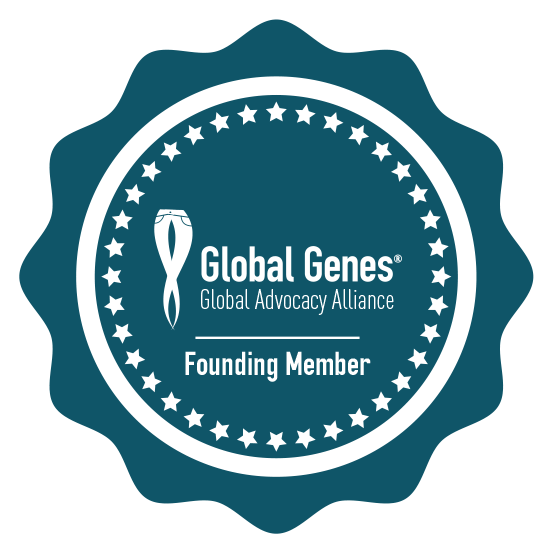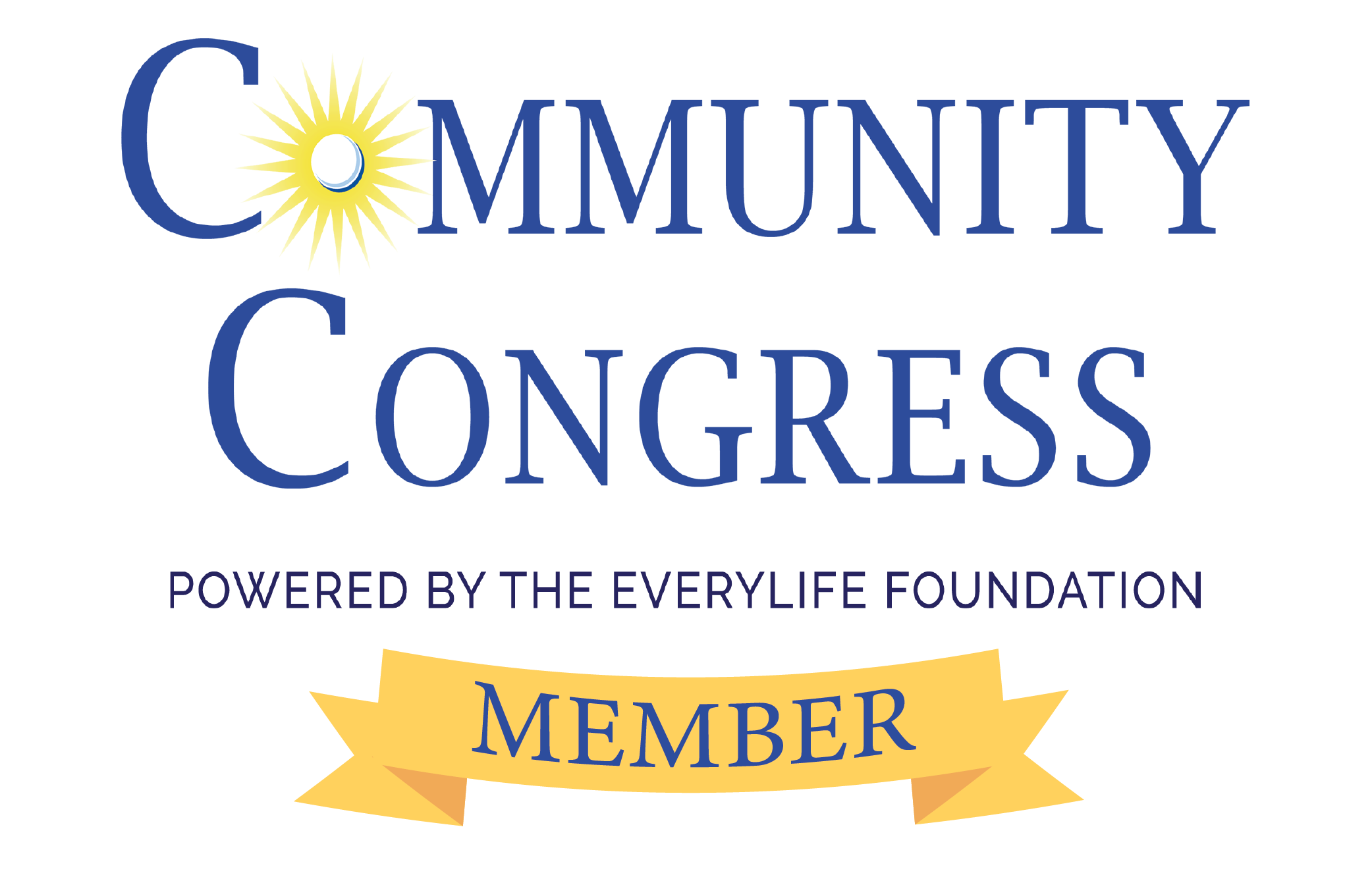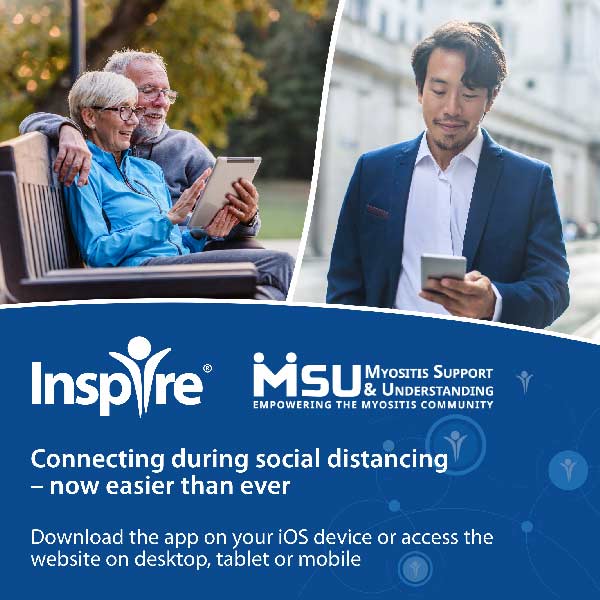Rare Disease Day 2023
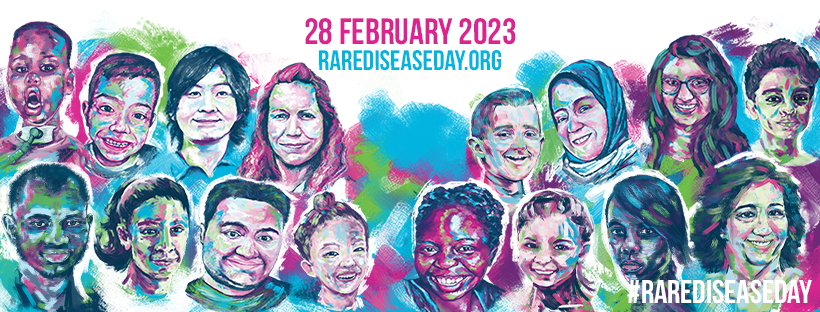
MSU helps myositis patients see the forest as well as the trees.
As you may know by the common idiom “you can’t see the forest for the trees,” it is often easy to lose your perspective when you are so focused on the “trees” or the details of a situation. Being diagnosed with myositis can be overwhelming. There is so much information that we tend to lose sight of the most important part – the “forest,” or in this case, the help and support MSU extends. MSU can help you see the forest as well as the trees.
Like a forest is made up of many trees, MSU is made up of many resources and guidance, creating the strong community it is. We like to think of the following as the “trees” in our forest:
Our Members
MSU is known as the heart of the myositis community. Through MSU’s support and educational programs, our members learn we are not alone. Just like trees are stronger when standing in a forest, so too, we myositis patients are stronger together! We are empowered. We are mighty. We are still rare, but never alone. Our members really care about each other; MSU fosters a family-like atmosphere, and our members make it a home. When we support each other, we learn we are not an individual tree in the darkness of myositis; we can see the forest of community, support, education, and empowerment. “In the myositis community, MSU is the forest and our members are the trees filling it!”
MSU represents rare disease patients experiencing myositis, a beautifully, diverse constituency filled with many voices. Out of that many, rises one strong community that supports and educates each other and reminds us that we are never really alone. If you are not yet a member, join for free here.
Our Programs
As a patient–led organization for a rare disease community, MSU is uniquely situated to be proactive in anticipating the obstacles our patient-members face. For instance, we are one of only nine rare disease patient advocacy organizations listed by Global Genes giving financial assistance to patients during the pandemic. Since the inception of MSU’s financial assistance program began we have awarded over $150,000 in financial assistance to myositis patients for expenses including, emergency household expenses, medical bills, life-improving assistive and mobility devices, and medical travel. Since the coronavirus was discovered in the US in February 2020, we have given in excess of $70,000 in financial support. Myositis is isolating and can be demoralizing; but often, hidden aspects of chronic illness are the financial stress and devastation, people feel shame even though the financial stress is through no fault of their own. MSU is immensely proud that financial assistance is one way we show our members the forest as well as the trees. We are grateful to be so successful in providing this much-needed support and giving people relief from feeling alone, scared, and having to deal with the financial stress of living with the rare disease myositis.
The Problems our Members Face
Having a rare disease means many doctors, even specialists, may never have seen a myositis patient before our members’ visits. This makes self-advocacy and patient education vitally important for both our patient-members and our care-partner-members. MSU was founded on the idea that an informed and supported patient is an empowered patient. That still influences every decision we make five and a half years later. Members benefit from reading about others’ journeys on our website devoted to the myositis patient and caregiver experience, MyositisLife, and our technical series, “Simply Put.” We ensure members are armed with information to know about myositis and advocate for themselves in the general day-to-day of dealing with this rare, systemic, autoimmune disease.
Even in extraordinary times, MSU helps our members be prepared. Another issue that members of the rare community face is that the commonly disseminated information in the news and from medical experts is not always exactly applicable. When the coronavirus hit, MSU immediately activated a response team to meet with myositis medical experts and share myositis-specific information about the pandemic. We immediately shifted our organizational focus to ensure that our members were getting information that would pertain directly to how the coronavirus would affect myositis and immune suppression. This included helping members formulate questions for doctors to help them take control of their care during this very scary time. This is increasingly important for rare disease patients as generalized information is not always applicable. It is yet another way MSU becomes a forest full of information to educate and empower our community, along with working to ensure those living with myositis can advocate for their health.
Myositis Treatments
As a rare disease with few approved treatments, when myositis patients were forced to find varying levels of quarantine, MSU arranged for many video support and education sessions. We have hosted Q & A sessions with experts on many aspects of myositis treatments. Due to the flexibility of our live video sessions and the ability to reach many experts, we have been able to address questions and issues as they arise for our members. One of the most successful sessions we host is the “exercise in place” series with OTs and PTs from the Myositis Center at Johns Hopkins. Many myositis patients derive great benefit from carefully curated exercises. This has been a huge help for those staying at home and unable to access their own OT/PT team and/or typical exercise routines. This, again, was a benefit of being a patient-run organization anticipating the needs of patients, by patients. Providing access to myositis experts is another way we fill out our forest and we often hear from the experts that they are extremely impressed with the level of knowledge and engagement of our members.
MSU’s DEI Committee
Myositis disproportionately affects women of color. The medical field has many inequities that are slowly being addressed. MSU has always worked hard to be inclusive. In July, MSU formalized and deepened its commitment to Diversity, Equity and Inclusion by starting a DEI committee. We are looking for volunteers to run the committee, help steer the organization, and inform the medical community on DEI matters. Ensuring every one of our members is included is part of making the forest of our community complete.
The Ongoing Work and Relationships of MSU
MSU’s model has not changed. We have always worked to meet our members’ needs. However, as we grow we continue to work to partner with stakeholders in more inventive ways, to provide even more avenues of support, and to match our members with research opportunities to help this rare disease community live more and more fulfilling lives, especially in such a hard time in history. We know that even as a rare disease, we still need to add more trees to expand the forest of support to improve the lives of our members. MSU is dedicated to forming relationships with companies such as those who make assistive devices which will make our members lives easier, infusion companies who can help educate and advocate for our members in getting their treatments, researchers looking at novel treatments or improved disease classifications, and medical centers working to provide myositis patients with comprehensive care.
We look forward to continuing to help our members see the forest as well as the trees.
Donations are used to fund our essential programs including our Myositis Patient Financial Assistance program. And as an all-volunteer nonprofit organization, more of your donation goes directly to help patients and caregivers. We appreciate your generous support.
What is Rare Disease Day?
Rare Disease Day (RDD) is held on the last day of February, this year on Tuesday, February 28th and this will be the 16th International Rare Disease Day coordinated by EURORDIS. Rare Disease Day is a day to raise awareness of rare diseases.
A rare disease, also referred to as an orphan disease, is any disorder that affects a small percentage of the population. In the U.S. a disease is considered rare if there are under 200,000 people living with the disease. Myositis, and its subtypes, are rare diseases.
Prepare and Get Involved: Rare Disease Day 2023
Create a video about your life with rare disease and share
Nothing speaks more volume than a video sharing your life or message of living with the rare disease, Myositis. Upload it to YouTube and share the link with us to post on our sites.
Share your rare disease experiences
We learn from the experiences of others. How has myositis, a rare disease, impacted your life? Write and share your experiences through our new #MyositisLIFE site. We will also feature your stories on our comprehensive myositis and MSU site.
Host a Rare Disease Pandemic Bubble Party
Are you isolating with your family or a select group of friends? Have a makeshift house party! You can order and share brochures, wristbands, pens, and info cards to help educate them. And, during the house party, have a fundraising contest for MSU. Incorporate video conferencing to invites other to join as well.
Change Social Networking profile and cover photos
Show your support of Rare Disease Day by changing your social networking profile and cover photos. Find photos to use at RareDiseaseDay.org
Search the Rare Disease website for events near you
Search for RDD 2020 events in your area and attend, taking myositis information cards and brochures to help promote awareness of our rare disease.
You can order MSU myositis pens and wristbands to hand out as well! Visit our Shop page.
Contact the media, write a letter to the editor
Contact your local newspapers, radio stations, and television stations to do a segment about Rare Disease Day and Myositis. You can contact us for help with wording.
Ways to help MSU
Create an online myositis fundraiser
Facebook fundraisers are a great way to raise money for patient-centered nonprofits like MSU. They are easy to setup and share, and Facebook covers all fees.
If Facebook isn’t for you, create a fundraising page with MSU directly using the Give Lively platform. Invite friends to join your team, set a goal, and share often. Get started below.

